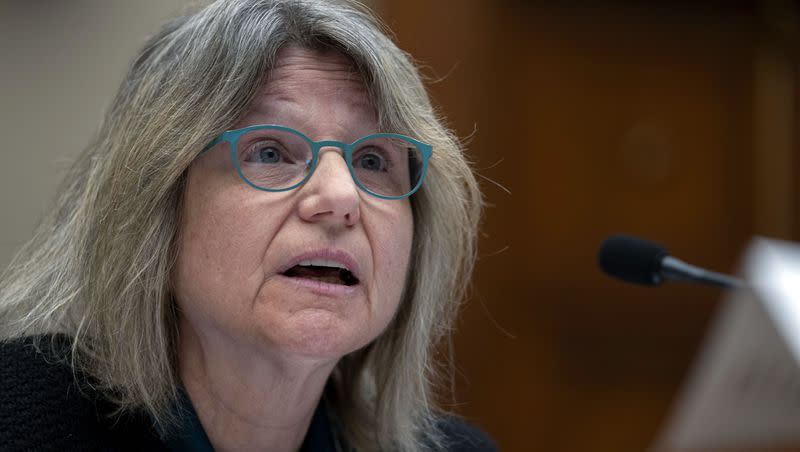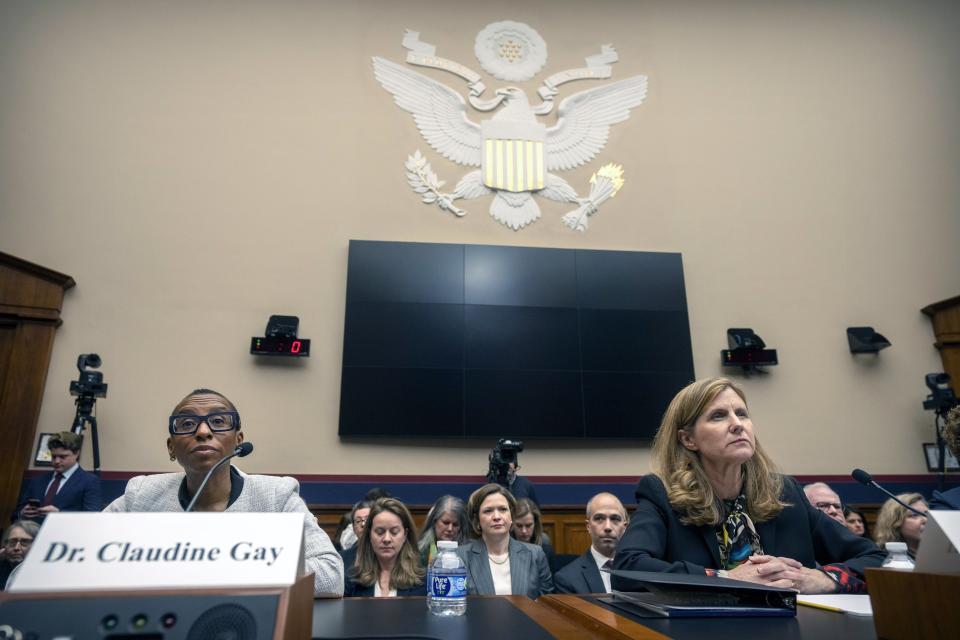Harvard, Penn and MIT presidents face blistering criticism from Rep. Burgess Owens, other GOP House committee members

- Oops!Something went wrong.Please try again later.
- Oops!Something went wrong.Please try again later.
Republican members of the House Education and Workforce Committee upbraided the presidents of Harvard, the Massachusetts Institute of Technology and the University of Pennsylvania on Tuesday over the universities’ efforts to address rising antisemitism on their campuses.
“Today, each of you will have a chance to answer to and atone for the many specific instances of vitriolic, hate-filled antisemitism on your respective campuses that have denied students the safe learning environment,” said Committee chairwoman Rep. Virginia Foxx, R-North Carolina, during Tuesday’s hearing in Washington.
“As you confront our questions in this hearing, remember that you are not speaking to us, but to the students on your campus who have been threatened and assaulted and who look to you to protect them,” she said.
The presidents, Harvard’s Claudine Gay, MIT’s Sally A. Kornbluth and Penn’s M. Elizabeth Magill, each acknowledged that antisemitism was a growing problem at their schools and society in general.
They explained they have stepped up campus security and taken action against anyone who harasses or discriminates against students, faculty or staff. While working to ensure safety, they are also protecting free speech.
“During these difficult days, I have felt the bonds of our community strain. In response, I have sought to confront hate while preserving free expression. This is difficult work. And I know that I have not always gotten it right,” said Harvard’s Gay.
Penn’s Magill said she has “condemned antisemitism publicly, regularly and in the strongest possible terms. And today, let me reiterate my and Penn’s unyielding commitment to combating it.”
She continued, “As president, I am committed to a safe, secure and supportive educational environment so that our academic mission can thrive. It is crucial that ideas are exchanged and diverse viewpoints are debated. As a student of constitutional democracy. I know that we need both safety and free expression for universities and ultimately democracy to thrive in these times, these competing principles can be difficult to balance, but I am determined to get it right.”
One critic of Penn’s actions is former Utah Gov. Jon Huntsman Jr., who is a Penn alum. Huntsman said the family’s Huntsman Foundation will stop making donations to the University of Pennsylvania over its lack of response to Hamas’ attack on Israel, this despite several generations of the family graduating from Penn and their long history of philanthropy to the university.
Related

MIT’s Kornbluth, meanwhile, said MIT has launched a campuswide effort to stand together against hate.
“It will emphasize both education and community building, especially in our residence halls. In addition to fighting antisemitism, it will address Islamophobia, which is also on the rise, and also underreported. MIT will take on both, not lumped together, but with equal energy, and in parallel,” Kornbluth said.
Rep. Brandon Williams, R-New York, said the purpose of the committee hearing was to assess the health of the nation’s “most elite, and until recently, esteemed educational institutions in this country,” disclosing he earned a graduate degree and spent a year at Harvard as a visiting student.
“We raised the question whether your institutions and others like them deserve to enjoy the benefits of partnerships with our government” such as research investments, student loan guarantees, tax-free status for endowments and funding for veterans’ education totaling perhaps $100 billion, he said.
Williams noted that each of the university presidents testified that education is the solution to push back against antisemitism.
“Yet your educational institution under your leadership and previous leaders is seething with hateful and threatening antisemitic demonstrations. But these are, only, as I mentioned, these are only against the Jewish students. No one else, just Jews at your school. Yet, you say you believe in accountability,” said Williams directing his remarks to Gay.
“Should the federal government keep shoveling money and privilege to institutions like yours that fail so profoundly in their mission? Your mission is to educate. Education is the solution. You have 387 years and you’ve arrived at this place of virulent antisemitism and hate. Why should the federal government continue to partner with you and such a failed accomplishment or lack of accomplishment?”
Meanwhile, Rep. Elise Stefanik, R-New York, called for Gay’s resignation after an intense exchange on where the Harvard president draws the line between protected speech and incitement to violence, and whether she would take disciplinary action against individuals who participated in rallies where there were calls for an intifada, or a violent Palestinian uprising. Stefanik is a Harvard alumnus.
Gay said the university gives a wide berth to protected speech, but acts when rhetoric crosses into conduct that violates the school’s policies on harassment, bullying or intimidation.
Rep. Burgess Owens, R-Utah, questioned what the academic leaders would do if it was determined that their diversity, equity and inclusion initiatives and use of critical race theory in academic study were linked to rising levels of antisemitism.
MIT’s Kornbluth pushed back. “I find it hard to understand how equity and inclusion as a concept is a hate inducer,” she said.
In a statement issued prior to Tuesday’s committee hearing, Owens decried antisemitism, noting it “has no place in America, yet it has found a home on our college campuses.”
He continued, “These institutions have failed to fulfill their core responsibility of keeping students and staff safe by allowing hate, harassment and violence towards the Jewish community to continue unabated.”
Rep. Joe Wilson, R-South Carolina, criticized the university presidents for not supporting ideological diversity on their campuses, and asked for figures on how many conservative faculty they employed.
“President McGill, what is the percentage of conservative professors allowed to teach at your institution?” Wilson queried.
“Representative. I strongly believe in a wide variety of perspectives. We do not track that information,” she said.
None of the presidents said they collected that information.
Wilson postulated that the lack of diversity and “inclusion of intellectual thought” was a contributing factor to rising antisemitism on college campuses.
“It’s due to illiberalism that has taken over the country. You might look into that and when you get your next government grant, with that in mind, the barbaric mass murder on Oct. 7 by Iran’s puppet invading Israel,” he said.
Related
Late last week, Utah Gov. Spencer Cox called on the state’s public colleges and universities to exercise “institutional neutrality.”
It “may be a little controversial, it should not be. ... This idea that every institution needs to weigh in on every political debate of the day, it’s one of the dumbest things we’ve done over the last 10 or 20 years as a country,” he said
The governor’s remarks came following the Utah Board of Higher Education’s vote to adopt a resolution establishing expectations for implementing principles of free expression on state-supported campuses.
In addition to institutional neutrality, the resolution calls on colleges to protect a speaker’s right to free expression at approved events or venues on campus and to provide a process for an institution to publicly address, condemn or prohibit expression or actions that violate the law.”

